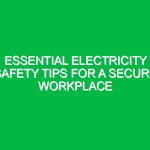Welcome, team! Today, we are going to discuss a crucial topic that affects our health, safety, and environment at work: Know Your Limits. Understanding and respecting your limits is essential for maintaining a safe and productive workplace. Let’s delve into the importance of setting boundaries and knowing when to stop to ensure a safer work environment for all.
The Significance of Know Your Limits at Work
Knowing your limits at work is not just about physical capabilities but also mental and emotional boundaries. It involves recognizing when you are reaching your capacity and taking appropriate actions to prevent accidents, injuries, and burnout. By understanding and respecting your limits, you contribute to a safer and healthier workplace for yourself and your colleagues.
Benefits of Setting Boundaries
- Preventing Accidents: By knowing your limits, you can avoid pushing yourself beyond what is safe, reducing the risk of workplace accidents.
- Promoting Well-being: Respecting your boundaries enhances your mental and physical well-being, leading to increased productivity and job satisfaction.
- Creating a Positive Work Environment: When everyone knows their limits and respects each other’s boundaries, it fosters a culture of safety, respect, and collaboration.
Identifying Your Limits
It’s essential to be self-aware and recognize the signs that indicate you are approaching your limits. These signs can include fatigue, stress, decreased concentration, or physical discomfort. By acknowledging these signals, you can take proactive steps to address them before they escalate.
Key Aspects of Know Your Limits at Work
Setting boundaries and knowing your limits involve several key aspects that directly impact your health, safety, and well-being in the workplace:
- Physical Limits: Understanding how much physical exertion you can handle without risking injury or strain.
- Emotional Limits: Recognizing when you are feeling overwhelmed, anxious, or stressed and taking steps to address these emotions.
- Mental Limits: Knowing when your cognitive abilities are reaching their capacity and avoiding decision fatigue or errors.
Potential Hazards and Risks
Failure to recognize and respect your limits can lead to various hazards and risks in the workplace, including accidents, injuries, reduced productivity, and increased stress levels. By being mindful of your boundaries, you can mitigate these risks and create a safer work environment for yourself and your colleagues.
Practical Tips for Setting Boundaries
Here are some actionable tips to help you set and maintain boundaries at work:
- Communicate: Clearly communicate your limits to your colleagues and supervisors to ensure everyone is aware of your boundaries.
- Take Breaks: Schedule regular breaks to rest and recharge, allowing yourself time to reset and prevent burnout.
- Delegate Tasks: Don’t be afraid to ask for help or delegate tasks when you feel overwhelmed or stretched thin.
- Listen to Your Body: Pay attention to physical and emotional cues that indicate you need to slow down or take a step back.
Real-Life Examples
Let’s consider a scenario where an employee, John, is working on a tight deadline and feeling overwhelmed. Instead of pushing himself beyond his limits, John communicates with his team and supervisor, who offer support and assistance to help him meet the deadline without compromising his well-being. By knowing his limits and seeking help when needed, John ensures a safe and successful outcome.
Regulations and Compliance
It’s important to note that setting boundaries and knowing your limits also align with safety regulations and company policies. By adhering to these guidelines and respecting your boundaries, you not only protect yourself but also contribute to a culture of safety and compliance in the workplace.
Conclusion
Remember, knowing your limits at work is not a sign of weakness but a demonstration of self-awareness and responsibility. By setting boundaries and respecting your limits, you contribute to a safer, healthier, and more productive work environment for yourself and your colleagues. Thank you for your attention and commitment to safety. Stay safe!


